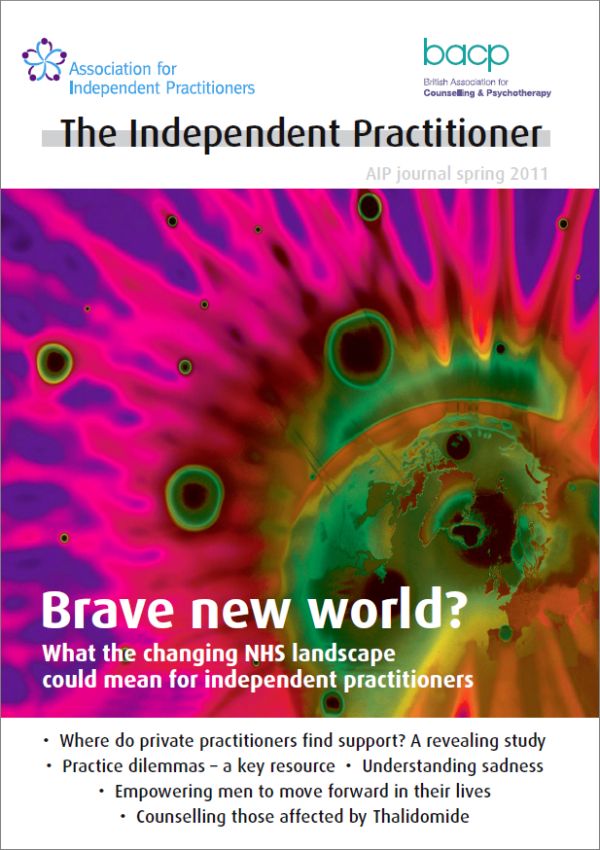In this issue
Perspectives
Liberation or limitation?
Adrian Hemmings considers the potential impact of the forthcoming NHS reorganisation on independent practitioners
In praise of sadness
Julia Segal puts the case for a better understanding of an often feared emotion
Projects
Beyond the physical
Francesca Thorpe describes her involvement in a pilot counselling project to support those affected by Thalidomide
Moving men
Helping men move forward in their lives is a passion for independent practitioner, David Polak
Research
Where do independent practitioners find support?
Insights from Pamela Savic-Jabrow, the author of a revealing study
Research support at BACP
Supervision
On being congruent
Gordon Sayers and Debbie Ruskin invite readers to observe their supervisory process
Resources
A question of ethics
The Ethics enquiry line can be a key source of support for independent practitioners, as Denise Chaytor explains
Regulars
My day
Manu Bazzanu starts the ball rolling in the first of a new series of articles in which independent practitioners describe a typical day
From the chair

Articles from this issue are not yet available online. Divisional members and subscribers can download the pdf from the Private Practice archive.
From the editor
Without wishing to cause anyone to choke on their cornflakes, have you ever considered that imagining how other independents operate is a bit like wondering about other people’s sex lives: you know it’s a universal activity, but you only ever have direct experience from your own perspective?
One way in is to carry out a study, and some illuminating insights into the working lives of independent practitioners are brought to us by the author of a study that investigated the types of support mechanisms used by independents. Although the study response rate was low (an interesting fact in itself) it’s direct evidence of what practitioners actually do and, as such, offers a unique perspective.
Widening the perspective out still further, Adrian Hemmings authors our cover story this issue, with a report on the shifting NHS landscape and the potential impact of changes to it on independent practitioners.
We also feature two projects, ostensibly very different, yet both supporting and empowering specific client groups. In its recently published report, ‘Delivering Male: effective practice in male mental health’*, MIND, in conjunction with Men’s Health Forum, looked at the mental health needs of males and the best ways of meeting these. And in this issue, we echo the theme with a look at a project that empowers men to make positive changes in their lives. The second featured project is a pilot, set up to counsel those affected by the drug Thalidomide. Having been born in 1960, at the time that babies were being born damaged by Thalidomide, I was one of the fortunate ones – my mother did not take the drug, commonly prescribed for morning sickness – but many were not so lucky. The author of the article, herself Thalidomide, describes the long-term emotional challenges that those affected by Thalidomide struggle with.
This issue of The Independent Practitioner sees some new regular sections and features. In a new supervision section, a practitioner and supervisor share their supervisory relationship with readers; a new resources section opens with a look at the BACP ethics team and specifically how it can support independent practitioners; ‘My day’ follows an independent practitioner throughout their day, at work and at play; and ‘Smalltalk’ takes a light-hearted look at life and work through the eyes of a practitioner.
If you would like to contribute to The Independent Practitioner, whether it be a project you are involved in, a perspective you would like to share with readers, a suggestion for My day, Smalltalk, or an idea for an article generally, please get in touch – my email address is below. On the inside back cover of this journal, and on the AIP website, you will find authors’ guidelines to refer to.
Finally, to return to where I started, the very nature of private practice involves working independently, with the potential for feeling isolated. That’s why having the chance to meet other practitioners is so important. The AIP conference this month is an ideal opportunity to meet peers and to network, with the added bonus of hearing some inspirational speakers give informed insights into the profession. I hope to see you there.
Jacqui Gray
Acting editor
jacqui.gray@bacp.co.uk
Reference
* Delivering Male: http://www.mind.org.uk/campaigns_and_issues/report_and_resources/4438_delivering_male_effective_practice_in_male_mental_health
